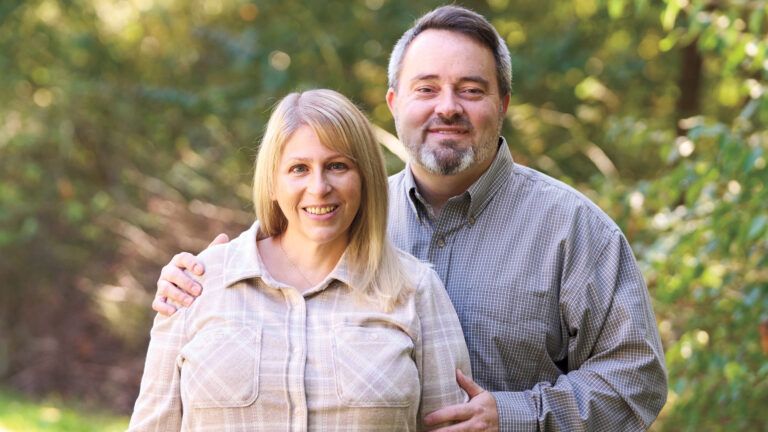My husband, Holmes, stood at the kitchen door.
“I think I might have found a job,” he said.
I looked up from the dishwasher. The news was wonderful, and wonderfully unexpected. But something in Holmes’s voice gave me pause. He sounded tentative.
“It’s in Dallas,” he concluded. “Temporary architectural consultant for a construction company. I just got off the phone and I think they’re going to make me an offer.”
I stared at him. “Dallas?” He nodded. My spirits fell.
Holmes desperately needed work. His last construction project had ended a month and a half before, taking the bulk of our income with it. But, Dallas? That was more than 200 miles away! A four-hour commute. And the job was temporary, so there was no point in picking up and moving.
Holmes muttered something about the pay being good, then retreated to the family room.
I sighed. He was the strong, silent type, not given to sharing his feelings. I knew his difficulty finding work depressed him no end. But how I wished we could talk! Not disappear behind our books and magazines or glued to the TV.
I finished loading the dishwasher and walked to the family room. Holmes was in his chair, reading. I curled up on the sofa with my laptop. My mind burst with questions about the job, about what Holmes was thinking. But I knew there was no point in asking.
Either our conversation would stall or we would end up arguing about our money worries.
We sat, silent, while the clock ticked. It was an all too familiar scenario, almost as if we had grown afraid of talking, as if any conversation would lead us back to that dreaded subject, our finances. No, better not to talk.
Finally we got up to go to bed. “Goodnight,” we mumbled into our pillows.
The next morning, after doing my devotions on the sunporch, I found Holmes brushing his teeth. “Maybe my sister and brother-in-law would let you stay with them,” I ventured. Much of my family still lived in Dallas, where I had grown up. “You could come home on weekends.”
Holmes nodded. Minutes later he returned from a quick phone call. “I start Monday,” he said.
Monday morning Holmes hoisted a suitcase into the trunk and backed down the driveway. I waved until I couldn’t see the car, then went back inside.
Closing the door, I realized with a stab of guilt that I wasn’t all that sorry to see him go. It wasn’t like his departure changed much. The house was just as silent with him there. We never went out. The days when he’d come home with yellow roses “just because” were long gone.
I kept busy. I did some writing on my computer, e-mailed some girlfriends, took a walk, then stretched out on the sofa with a novel. That afternoon our daughter, who lived down the block, came over with her kids. The house felt lighter without the tension between Holmes and me. But I was restless. It hadn’t always been like this.
I couldn’t stop thinking about better days in our relationship. How cared for I’d felt on our first date at Baylor University when Holmes held the car door open and then gently took my elbow walking into the old Beacon Theater in Waco. We’d shared a bucket of popcorn. When the last few kernels were left, our fingers brushed and my face flushed. Moments later, Holmes reached over and cradled my hand in his.
I remembered raising our three children together. Holmes getting started in the building industry. We’d had our share of financial ups and downs over the years. But nothing like this. Somehow our marriage seemed to be suffering more this time around.
Once, when we were living in Maine and the housing market had stalled out, Holmes ended up taking a night shift at a printing plant. I worked as a substitute teacher and we squeaked by on savings.
Still, we’d had good family times. Our schedules let us spend days with the kids picnicking, bicycle riding, taking trips to the beach. Maybe that was it. With the kids grown and gone, there was no longer a buffer between us. Maybe we were experiencing some fundamental flaw in our relationship. Something we’d never acknowledged before.
The next morning I sat on the sunporch with my Bible. I came across a passage in Romans: “Love one another with genuine affection, and delight and honor one another.” The simple words went straight to my heart. Affection. Delight. Where had it all gone? Lord, help us love each other like that again.
That night Holmes called to check in. Maybe it was because he was on the phone, not sitting in his chair, but he actually talked. “Job seems pretty good,” he said. “I’m getting to work on houses.”
I told him about my day. He filled me in on the latest news from my sister’s house. “I better go,” he finally said. “Got to get up early tomorrow.” He paused. “I miss you, Cheri.”
I caught my breath. “I—I miss you too,” I stammered. We hung up.
The next day I puttered around the house, strangely eager for Holmes’s phone call. When the phone rang, I jumped for it. We talked even longer that time. And not about money for once. This time I didn’t hesitate telling Holmes I missed him. He answered right back.
Friday arrived. Holmes would be home that evening. I turned on my computer after lunch to check my e-mail. I about fell over. There in my inbox was a message from my husband, who almost never used computers. “I’m learning e-mail for the job,” he wrote. “Can’t wait to see you tonight. Love you, H.”
I stared at that e-mail. What was going on here? I believed in answers to prayer, but this was uncanny.
Something was different. Something had changed in our relationship without my realizing. Was it the distance? Was that why I felt almost giddy contemplating Holmes’s return that evening?
|I could hardly work the rest of the afternoon. Finally, I abandoned the computer and got started on dinner. I made Holmes’s favorite—meat loaf and mashed potatoes. While the meat loaf baked, I shook out a tablecloth and lit a scented candle. I went to our bedroom to change. I chose a green sweater I knew Holmes liked. Then I went to the window and watched for his car.
He pulled into the driveway. I glanced in the mirror, ran my fingers through my hair and threw open the door. There he was. With a bouquet of yellow roses.
I hugged him—when had I last done that?—and practically skipped into the dining room. We ate, talking the whole time. Holmes’s job wasn’t so different from some of the other projects he had worked on, but he now had a week’s worth of news about it. He wanted to hear about my days too. Somehow, we found all kinds of things to discuss that we hadn’t talked about on the phone.
Holmes came to the end of something he was saying. We were silent a moment. I gazed at him across the table, admiring his kind, thoughtful face in the candlelight. All at once it struck me. The missing ingredient in our relationship this past week was money. Our separation after all these years together pushed even that worry aside, as if a light had been shone on what was truly important about our marriage.
Holmes’s going to Dallas had exposed a flaw in our relationship. Left to our own devices, rattling around the house together, all Holmes and I had been thinking about and arguing about and stressing about was our shaky finances. It took a break in that routine—a break from that all-consuming fear and worry—to bring the rest of our marriage, all that was good and godly in it, into focus.
I reached over and took Holmes’s hand. Genuine affection. It felt wonderful.
Our money troubles didn’t evaporate overnight, but we finally learned to discuss them in a way that didn’t drive us apart. Besides, you’d be surprised what a good—and inexpensive—time you can have eating breakfast together on your porch, watching the cardinals and finches alight on the bird feeder. Or browsing at the bookstore in the mall and later sipping coffee in a café.
Or, my favorite, catching a matinee. That’s what we did that Sunday after church. We drove to the multiplex, sorted through myriad options—so different from the little Beacon Theater back in Waco!—and bought tickets.
Settling into our seats, I reached for some popcorn. Holmes’s hand brushed mine. I glanced at him, feeling my heart quicken. Holmes glanced back at me, smiling. The movie started and we leaned in close. We were still holding hands when the lights came up.






